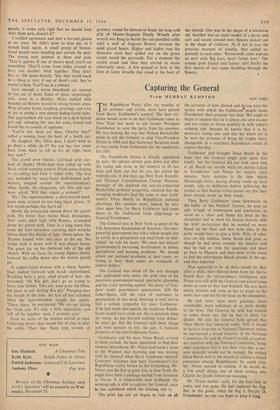Capturing the General
From MURRAY KEMPTON
NEW YORK
TFne. Republican Party, after six months as his prisoner and victim, must have passed from Barry Goldwater's control. The best evi- dence would seem to be that Goldwater came to New York last week to ask former President Eisenhower to save the party from his enemies. He was making the trip that Nelson Rockefeller made to ask the General to stop Vice-President Nixon in 1960 and that Governor Scranton made to beg rescue from Goldwater for the moderates last July.
The Republican drama is ritually appointed by now; the curtain always goes down just after the losing side turns to the General as its last hope and finds out that he, too, has joined the winning one. A few days ago New York Republi- can National Committeeman George Hinman, manager of the depleted but not-yet-exhausted Rockefeller political properties, claimed that the avenging moderates had the votes to oust Gold- water's Dean Burch as Republican national chairman. His enemies must, indeed, be very close upon him, for Barry Goldwater had come down to the traditional futile pilgrimage to General Eisenhower.
The General was in New York as guest of the Life Insurance Association of America. 'An over- powerful government can rob a whole people just as surely as a pickpocket can steal from an indi- vidual,' he told his hosts. 'We must not tolerate [government's] increasing involvement in urban, agricultural and housing problems. We should attack our national problems at their roots, re- fusing to bury them under an avalanche of federal dollars.'
The General was loved all the way through and applauded only twice, the gold rims of his putatively-government-issued spectacles gleaming and his voice warning against 'the decay of free- dom' under government paternalism. Still the father-figure, still the rock of resistance to paternalism. It was hard, listening to him' not to feel a certain sympathy for poor Goldwater. If he had made that speech, the moderate Repub- licans would have cried, see, this is precisely what we mean; he has learned nothing from defeat; he must go. But the General said these things and went upstairs to rest, the safe, if transient property of the anti-Goldwater forces.
Goldwater and his man, Dean Burch, arrived at three o'clock, the hour appointed, to find their enemies beforehand. Mr. Nixon had taken a room at the Waldorf that morning and was waiting with his General when Barry Goldwater entered. Governor Scranton had been Eisenhower's last Republican visitor before he left Gettysburg; Mr. Nixon was the first to greet him in New York. He might have been a package mailed from Scranton to Nixon. It is remarkable how brilliantly the winning side is able to capture the General, once he has calculated which the winning side is.
The print has not yet begun to fade on all
the accounts of how shrewd and dlring were the tactics with which the Goldwateil" people made Eisenhower their prisoner last June. We ought to begin to suspect that he is always his own master and too canny to throw publicly in with today's winning side because he knows that it is to- morrow's losing one, and that his whole art is by now the pretence of being the trophy inter- changeable in a continual Republican round of capture-the-flag.
Goldwater had brought Dean Burch in the hope that the General might look upon him kindly, but the General did not look upon him at all. Burch sat outside while his patron talked to Eisenhower and Nixon for exactly sixty minutes. Sixty minutes is the time which Mississippi jiiries, haying already made up their minds, take to deliberate before delivering the verdict so that hostile critics cannot say that they have already made up their minds.
Then Barry Goldwater came downstairs to the lobby of the Waldorf Towers, by now an ugly wriggle of cameramen and journalists, to stand on a chair and bump his head on the chandelier and to show his bruises bravely with the brief declaration that he wanted no more blood on the floor and that both sides in the party would have to give a little. With all other eyes on this tableau, Dean Burch had gone as though he had never existed; the Senator said that he had no time for questions and must go back to Phoenix and then went to the street to find the unfortunate Burch already in the car, and they departed.
That appeared to be all there would be. But, after a while, there filtered down from the thirty- fourth floor the extraordinary intelligence that Nixon was still with the General and would come down as soon as they had finished. He was there ninety minutes and came at last to stand on the same chair and not hit his head on the chandelier.
He had never been more gracious, more reasonable, more solicitous of or more deadly to the loser. The General, he said, had wanted to come down too, but he had to dress for dinner. He and the General both agreed that Dean Burch had laboured nobly. Still, it would be hard to keep him as National Chairman, unless he represented a broad majority of the National Committee. He and the General would, 9f course, not interfere with the National Committee, being elder statesmen; but it was their view that a one- vote majority would not be enough. He wished Dean Burch well in the search to achieve a broad consensus among Republicans; he could stay, Mr. Nixon seemed to explain, if he would do a few small things, one of them turning into Charles de Gaulle tomorrow morning.
Mr. Nixon smiled, easily for the first time in years, and was gone. He had captured the flag. But, in this game, when the flag is Dwight D. Eisenhower, no one can hope to keep it lung,




























 Previous page
Previous page